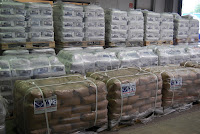
UHPC linings of all kinds of pipes inside and
out was one of our first major projects more
than 25 years ago. The pipes should be
permanently protected against wear and
corrosion with UHPC under the toughest
conditions. First of all, pipes for pneumatic
material delivery lines in the cement industry
were lined. After that, pneumatic and hydraulic
pipelines for the coal-fired power plant industry
and the steel industry were lined. Later came
the offshore industry and the wastewater

industry. We lined pipes of any diameter from
40mm / 1,57inch to 8000mm / 315inch. Here,
the geometry played no major role, so
whether Y-piece, pipe bend, reducer, etc.
The huge advantage of UHPC over all liners at
that time was the seamless lining, the flexibility
in layer thicknesses, the variations in material
quality and the very high wear and corrosion
resistance for a very long service life. Even
today, pipes are in use that were lined 25 years
ago with UHPC.

Today, new pipe systems are lined with UHPC
or existing pipe systems are repaired with UHPC
material. It makes only a very small difference
whether they are concrete or steel pipes.
We use UHPC mortar, UHPC castable and
UHPC shotcrete as lining material. UHPC
Rapid material grades are used for extremely
fast repairs.
In the offshore industry, UHPC is used both
as the inner and outer lining of pipelines.

UHPC can also be used underwater. A 15mm
or 0,6inch thick UHPC coating is waterproof
and absolutely corrosion resistant. A UHPC-
lined offshore structure no longer requires
regular corrosion protection coatings. UHPC
is used today as a material for offshore
constructions and offshore foundations
worldwide.
For some years, we use high temperature resistant
UHPC material in the steel industry. Hot gas
temperatures up to more than 1000°C / 1832°F
are no problem here. We also coat hot gas pipe
system with a combination of UHPC and high
performance insulation. This makes it possible
to dispense with stainless steel as a construction

material, which in turn reduces costs enormously.
Wastewater pipelines, storm water drains, storm
water storage systems road drainage systems,
sewage systems and culverts whether made of
steel or concrete, can be easily repaired with
UHPC. It is not necessary to clean the
construction of rust before you start with the
lining. With UHPC Shotcrete, larger pipelines
can be quickly and permanently repaired. Due
to the extremely low rebound of less than 3%,
special cleaning work in the pipeline is not
necessary.
Smaller repairs can be done quickly with UHPC
mortar or UHPC Cast. As UHPC materials
exceed the compressive strength of all standard

concretes by more than once, steel and concrete
pipelines are more resilient after a complete repair.
Advantage of UHPC
Absolutely waterproof
Absolutely moisture resistant
Extremely corrosion resistant
Very high life expectancy
Very good resistance to a variety of chemicals
Very high strength
www.hhbc-consulting.de
info@hhbc-consulting.de
 We have an order to supply and install a UHPC wear protection liner in a new grinding system at an ore processing plant in Bahrain. The new grinding system was designed
and delivered by a large German plant manufacturer.
We have an order to supply and install a UHPC wear protection liner in a new grinding system at an ore processing plant in Bahrain. The new grinding system was designed
and delivered by a large German plant manufacturer. The contract included the lining of pipelines, cyclones and separator systems. The assembly of a 25 mm / 1 inch UHPC wear protection liner with a total area of over 600 sq / 6450 sq ft was performed by a local installation company under the supervision of one of our supervisors.
The contract included the lining of pipelines, cyclones and separator systems. The assembly of a 25 mm / 1 inch UHPC wear protection liner with a total area of over 600 sq / 6450 sq ft was performed by a local installation company under the supervision of one of our supervisors.





































